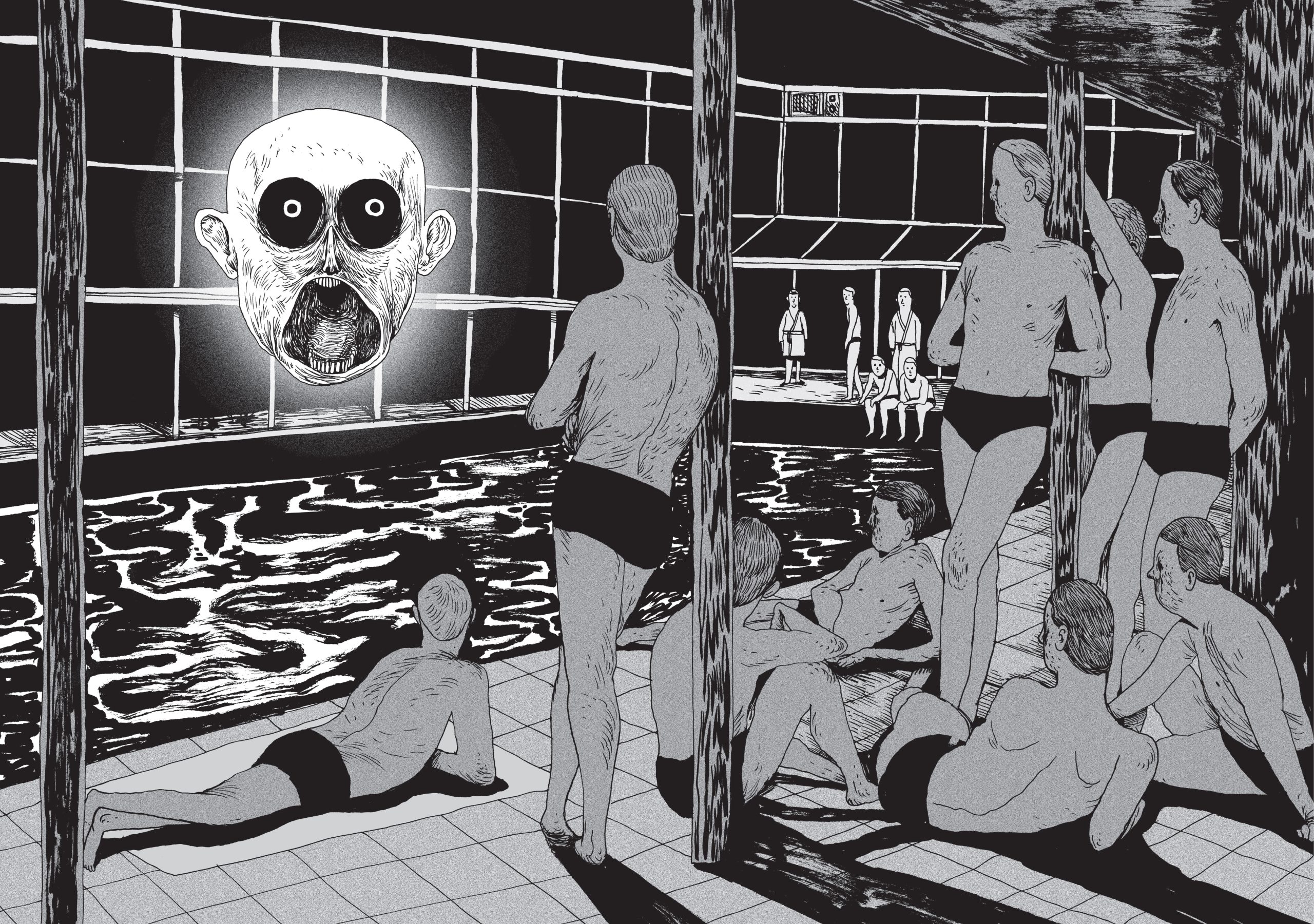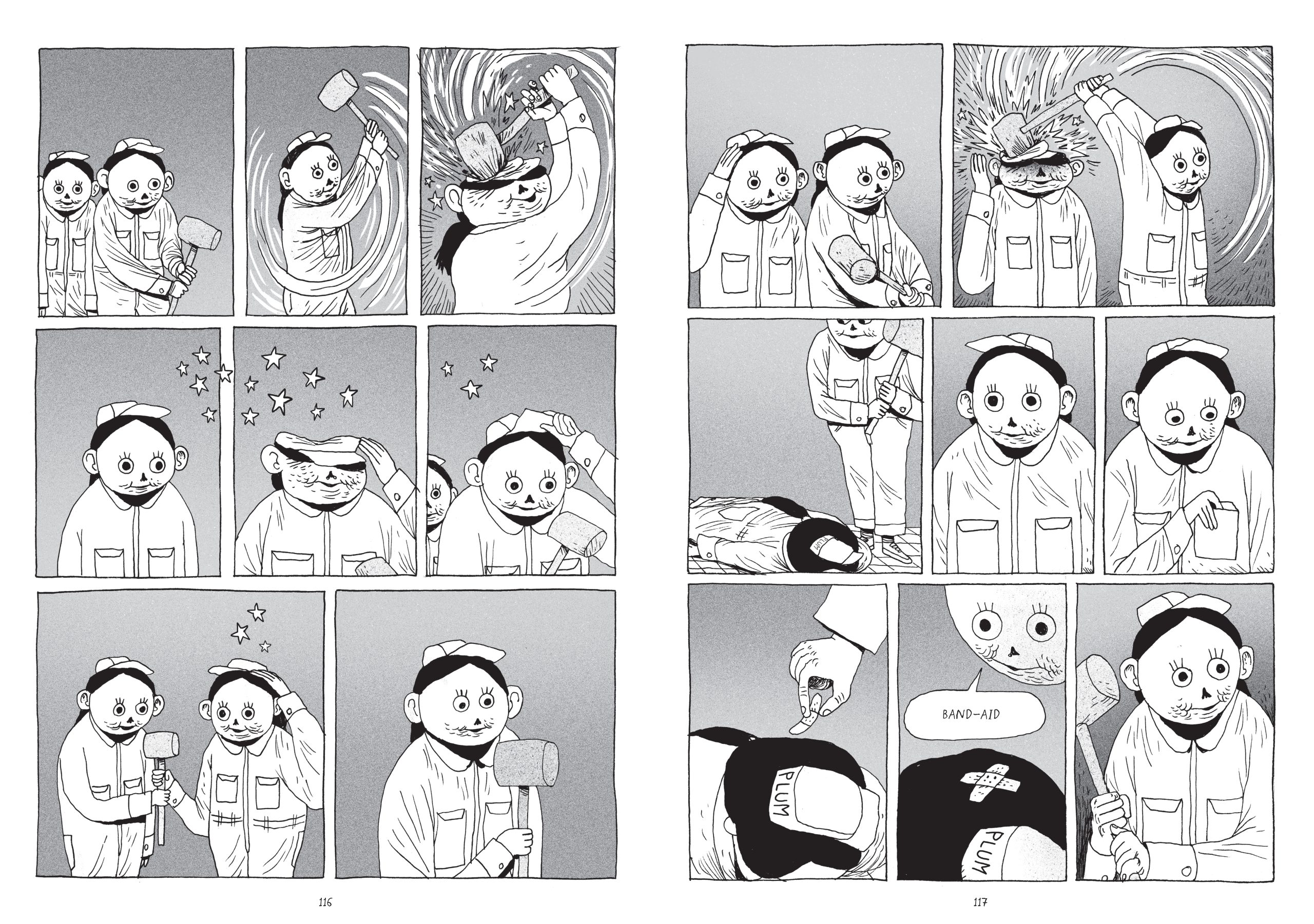Sure, the dark substance oozing out from the corners of the bathhouse could be mold growth from the moisture, but it’s gelatinous enough to drip from the tiled ceiling onto the otherwise pristine white shirt of the new employee replenishing fresh towels. That mysterious fungus, or whatever it is, provides the organizing principle of Erik Svetoft’s full-length debut, Spa, which treats Lovecraftian horror like the mundane, inevitable result of a deep cleanse. The inhabitants of the world-class resort and conference hotel are gradually overwhelmed by the creeping morbidity. But they respond by simply going about their routines, as if demonic possession is just a part of the itinerary, slotted in after massages and bocce ball.
This strain of horror grows from the belief that the most unimaginable terrors are in fact constantly lurking right outside your periphery. Spa’s resort is a labyrinth of uncertain depths, with prowling phantasms and hanging portraits that have ongoing stories of their own. Svetoft has an obvious skill for creating a sense that something is wrong even if you can’t put your finger on exactly what. The book is full of monolithic images that feel at once familiar and alien. It could have easily been nothing more than a gallery of non-sequential horror ideas and still been extremely potent.
Yet Svetoft manages to churn that abundance of ideas into a satisfying whole - not quite a narrative, but a cumulative force with a palpable wallop. One of the book’s biggest successes is that Svetoft fundamentally refuses to explain or comment on the action, but still recruits your emotional investment. The first third of the book reads like the pilot of a TV show with a massive ensemble, where you’re supposed to follow each character’s day-to-day needs even while unsure how they all link together: this guy is having trouble fitting in, this guy might be dissatisfied with his job, this couple is on vacation because they keep discovering rotting corpses in their apartment. In this world, a few breathing exercises could swiftly turn trivial concerns into ritual transmogrification.
It works because Svetoft makes choices throughout that allow you to track everything, even without fully understanding it. He draws the shadowy horrors way more realistically than he draws the central characters. Spa’s humans have minimalist, almost Cubist faces with dots for eyes. His artistic skill often hides in plain sight. A sequence near the beginning introduces a series of homogenous-looking bathhouse workers, distinguished only by chunky details like their hair color or the curves of their noses. But when you see some of them later, they’re instantly recognizable. As the action unfolds, small changes to those eye dots, like merely turning them crooked or giving them a doll’s eyelashes, evoke altered states of consciousness.
Svetoft drops in on every level of the resort’s hierarchy, from the VIPs and the owner to the sales reps and new hires. Each couple of pages is a vignette that approaches horror like it is a three-part-build comedy, but in place of punchlines is a vaguely sickening tug at the subconscious. (Except when it is actual comedy. At one point, characters literally slip on a banana peel.) Like any good comedy writer, Svetoft sets up expectations and then craftily subverts them. Without giving too much away, there’s an extended sequence at the heart of the book that audaciously pulls out surprise after grisly surprise. Most authors would wrap it up after that sort of extended climax. Spa bottoms out two-thirds of the way through and then hangs around in the void awhile, soaking in the aftermath.
Metaphors don’t get more reliable than “scrubbing away at something forever unclean.” Obviously, Lady MacBeth is the alpha and omega of that particular image. But Shakespeare’s focus was the internal stain that could never come out. For Svetoft, it’s the world that’s grimy. Setting a plague from the netherworld somewhere that’s expected to be immaculately serene and germ-free is such a pure masterstroke that it’s astounding it hasn’t been used more often. Spa follows through with about as fully-formed a debut as something this slippery and surreal could reasonably be. The mysterious ooze gives the book shape, but the horror connects because Svetoft creates a sprawling ensemble, with each player approaching it as simply a mess to be cleaned or a problem to be solved, offering practical solutions to a hellmouth until they are gradually subsumed by it.









